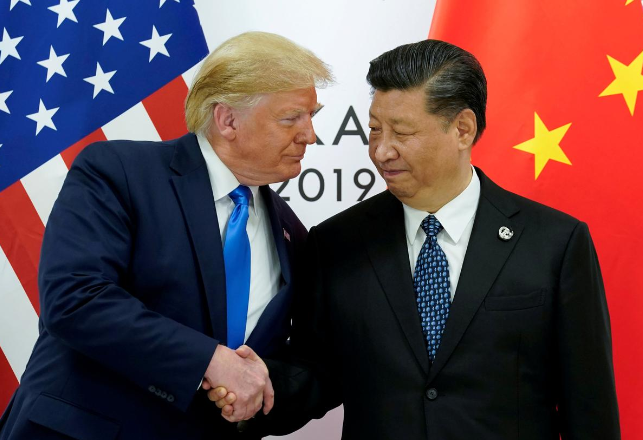Trump’s Fake Cold War
Donald Trump’s relationship with China is not a great power competition: He’s a propaganda generator, not a geopolitical adversary.

Lisa Van Dusen/For the Hill Times
June 25th, 2020
Because Donald Trump has transformed the American presidency into less of a global leadership role than an anti-democracy propaganda vehicle, it was going to be a matter of hours following the publication on June 20 of Nick Kristof’s New York Times column, “China’s Man in Washington, Named Trump,” before the White House dropped a countervailing headline.
That headline was dutifully generated by Peter Navarro, the same Trump aide who once said of Justin Trudeau that there was a “special place in hell” for the Canadian prime minister for “engaging in bad faith diplomacy” with Trump, of all people. This time, the content IED was Navarro’s claim on CNN’s State of the Union on June 21 with Jake Tapper that COVID-19 was “a product of the Chinese Communist Party.”
The claim had the added value of absolving China in the minds of intelligent people by having such a far-fetched allegation emanate from the mouth of a Trump official—a source category entirely discredited by the 20,000 lies propagated by Trump multiplied by the thousands more delivered by his mouthpieces—and incriminating China in the minds of inexplicably gullible people who still believe anything anyone in the White House says.
Above all, it was meant to distance Trump from China for the record, in keeping with the election-year trope that the president who has done more for China than any leader since Deng Xiaoping is an antagonist of Beijing rather than an enabler.
“All that is preposterous,” Kristof writes of Trump’s performative China-trolling, including his portrayal of Democratic rival Joe Biden as “soft on China,” “for it is Trump who has been China’s stooge, a sycophantic flatterer, and enabler of President Xi Jinping.” Kristof cites as the latest evidence of Trump’s “prostration” before China the passage in former national security adviser John Bolton’s book describing Trump in conversation with the Chinese president, “pleading with Xi to ensure he’d win” the upcoming presidential election.
That Trump would have articulated that request seems—as with every other shockingly unsurprising bombshell revelation reported from Bolton’s book—more than a little unnecessary given his spectacular value as an asset to Xi’s systematic, Belt and Road purchase of a non-democratic new world order intended to replace the democratic one the last president of the United States led.
The notion—propagated by many of the same voices who’ve lubricated the shift away from democracy by normalizing Trump’s lunacy in isolation from larger global trends—that the United States and China are now engaged in a classic great-power rivalry and new Cold War situates the dynamic within a conventional geopolitical context rather than the unconventional one in which it exists. That unconventional context—of a president not at odds with a geopolitical competitor whose undemocratic, surveillance-state system of government poses a threat to his own citizens but in service to that competitor—is unprecedented in the history of the United States, and represents the most consequential norm Trump has broken in his relentless rampage of norm-breaking.
In a commentary piece in Xinhua last week that vividly illustrates Beijing’s view of democracy as an existential threat, the many narrative tropes generously generated by Trump were leveraged to portray America as a basket case and democracy as a danger to its people. In “Putting Elections First Ripping America Apart,” Ma Qian concludes, “The odds that this election will help put a fractured United States back together by any measure possible seem pitifully low.”
Meanwhile, in Canada, the democratic government that has stood up to China’s bullying more than any other is portrayed by Beijing’s apologists as naïve or even reckless for taking a stand.
Lisa Van Dusen is associate editor of Policy Magazine and a columnist for The Hill Times. She was Washington bureau chief for Sun Media, international writer for Peter Jennings at ABC News, and an editor at AP in New York and UPI in Washington.
